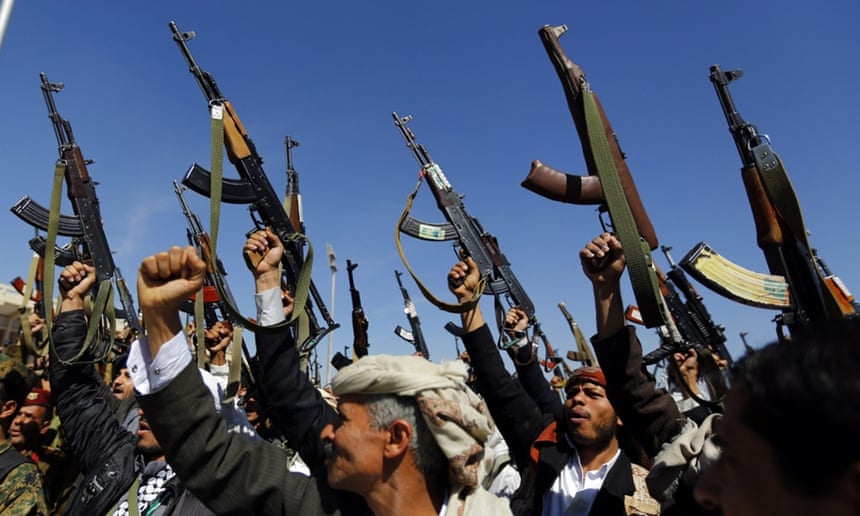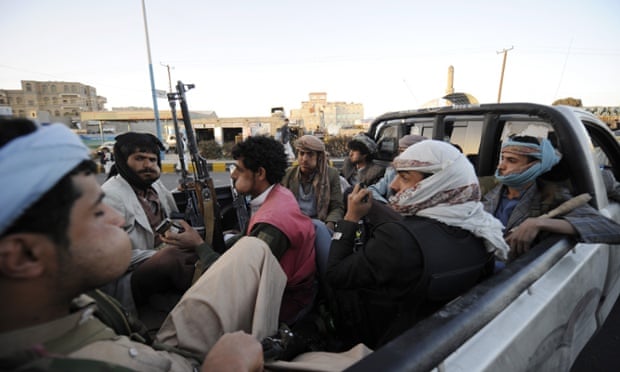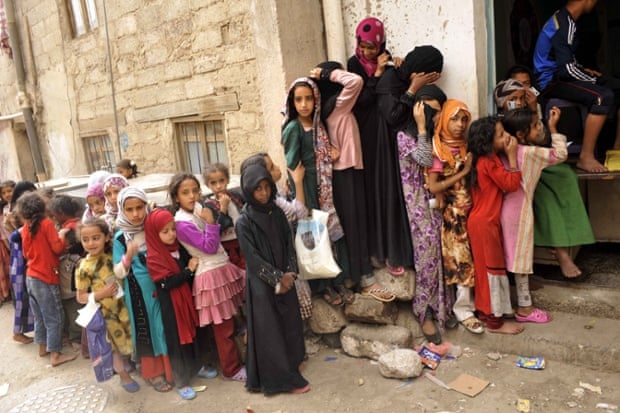Donors urged to step in with almost two-thirds of country’s population – including 840,000 acutely malnourished children – in need of assistance
Date: Thu, 12 Feb 2015 23:57:47 +0100
Yemen facing 'forgotten crisis' as humanitarian disaster looms
Describing Yemen’s humanitarian situation as a “forgotten crisis”, Grant Pritchard, head of advocacy for Oxfam in the capital Sana’a, said that international donors, including wealthy Middle Eastern nations, needed to step up to the plate and provide funds for the nearly 16 million people, or 61% of the population, in need of assistance.
Last month, Shia rebels from the Houthi movement, who had been besieging the capital for months, moved against the president, Abd-Rabbu Mansour Hadi, capturing his presidential office and confining him to his private residence. Hadi and his government subsequently resigned.
Last week, the rebels announced that they had taken over and dissolved parliament, plunging the country deeper into turmoil and threatening to turn the crisis into a full-blown sectarian conflict, pitting the Iran-backed Houthi Shia against Sunni tribesmen and secessionists in the south.
On Wednesday, the US, Britain and France said they were closing their embassies and urged their citizens to leave the country. Tens of thousands of Yemenis also took to the streets to protest the Houthi takeover as fears grew of a civil war.
Yemen, the poorest country in the Arab world, has long been a focal point of instability in a volatile region. Bordering Saudi Arabia, the world’s top oil exporter, it is home to one of the most powerful branches of al-Qaida, al-Qaida in the Arabian Peninsula, which claimed responsibility for the January attack on France’s Charlie Hebdo newspaper.
The political uncertainty in Sana’a has deepened the humanitarian crisis, which is so profound that one in every three people needing help in the Middle East is Yemeni.
It is not clear how the embassy closures will affect humanitarian operations in the medium term, although Oxfam and Médecins sans Frontières (MSF) said on Wednesday it would continue operations while monitoring the situation.
“This is actually a very critical time … The 16 million people who are already struggling are going to struggle even more, and that number will presumably grow as others find themselves falling into the poverty trap,” Pritchard said.
“We are trying to warn the international community that this is possibly going to happen … We would hope that a number of wealthier regional players would step up to the plate and help,” Pritchard said.
Just over 10 million people in Yemen need food assistance, including 840,000 acutely malnourished children, while about 13 million have no access to safe water and sanitation, and more than 8 million lack adequate healthcare.
Oxfam, which provides water, cash grants and sanitation facilities, said in January that a “humanitarian crisis of extreme proportions” could unfold if instability continued, warning that unless the crisis was addressed it would be almost impossible to stop it becoming deadly.
“Despite the challenges, we continue to deliver desperately needed aid to Yemenis in some of the poorest areas outside the capital,” said Grace Ommer, Oxfam’s country director. “But if the international community continues to stand by and watch while Yemen risks going from a fragile to a failed state, we will find it even harder to maintain this lifesaving support.”
The head of mission for MSF in Yemen, Marie-Elisabeth Ingres, said before the embassy closures were announced: “There is a difficulty for many people to access healthcare, particularly when there are clashes, but also because many people live in extremely remote areas where there is no health provision for many miles. Not only does conflict cause more casualties; it also hinders access to care for patients not directly affected by the fighting.”
MSF has been supporting public and private hospitals in Sana’a and has donated dressings, antibiotics and anaesthetics. It has also set up a Yemen emergency pool to respond quickly to urgent situations in Sana’a and the governorates.
“There is definitely a need for health facilities to be prepared for mass casualty situations and so we are working with a number of health facilities in various governorates … So far, we have conducted training on mass casualties, stabilisation and first aid in Sana’a, Aden and Al-Baydha governorates. But it’s not always easy to hold these trainings in their intended locations due to insecurity,” Ingres said.
“We also need to be in contact with all sides, to be sure they understand our principles of neutrality and impartiality. We try to be transparent and explain to all sides that we treat people regardless of their background or affiliation.”
The UN Office for the Coordination of Humanitarian Affairs (Ocha) said last week that political tensions have created an increasingly uncertain environment, but humanitarian operations were so far largely unaffected.
It said the 16 million people in need of assistance represented an 8% increase since 2014. UN partners are seeking $748.1m this year. Last year, the UN’s response plan for Yemen was only 57% funded, according to the UN’s Financial Tracking Service.
“The majority of targeted people live in areas where chronic underdevelopment and endemic poverty have potentially life-threatening consequences, leaving people in need of emergency assistance and protection support,” Ocha said, adding that children were among the worst affected by the violence.
“Unicef estimates that 200,000 children were affected by attacks on schools, as well as by the occupation or closure of school facilities in 2014. In December alone, 50,000 children in Al Bayda, Al Jawf and Sa’ada needed assistance to get back to school,” Ocha said.


